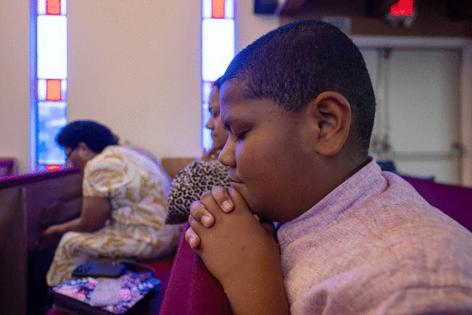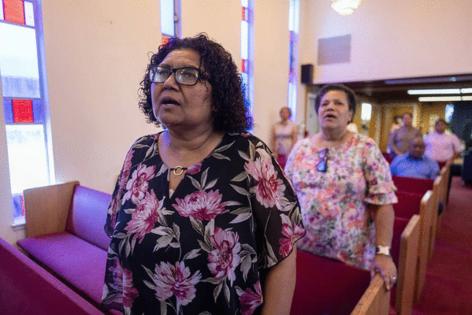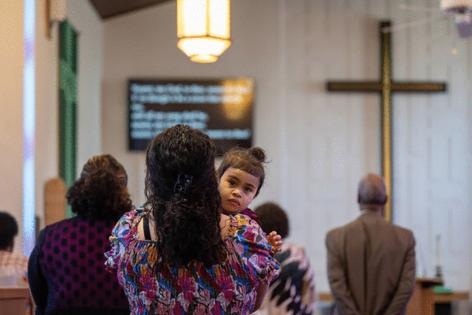This vibrant Fijian community relies on faith, food and family ties
Published in Religious News
SACRAMENTO, Calif. -- Joseph O’Connor, pastor of the Sacramento Fijian Seventh-day Adventist Church, doesn’t mind that his congregation meets in a rented space off Arden Way.
On Saturdays, the church is one of many spaces where Sacramento’s Fijian community explores fellowship, food and faith within California’s capital city. Sacramento is home to the largest Fijian population in the U.S. More than 50,000 Fijians resided in the states as of two years ago, with more than 10,000 settled in Sacramento, according recent census data.
O’Connor grew up “half-caste” in Fiji. His great-grandfather, who is Irish, married an Indigenous Fijian woman. Characterizing much of his upbringing was the melting pot within the Fijian nationality with both Indo-Fijians and natives.
The term “half-caste” was used for people of multiracial descent by British colonialists to classify Indigenous people, according to the Journal of Intercultural Studies. In Fiji, when European and Indian immigrants began migrating, marrying and conceiving, people of mixed descent were called half-caste, kailoma or vasu. Over time, these people experienced discrimination and poor treatment from the government and the categorization created tension between mixed Fijians and their Indigenous counterparts.
Indigenous Fijians, iTaukei, are a mix of Polynesian and Melanesian. The Indo-Fijian population arose from indentured laborers from India relocated to the country in the late 19th century by British colonizers. iTaukei make up more than half the country’s population, and Indo-Fijians more than a third.
O’Connor first moved to the states in 1999 to receive an education at La Sierra University, Riverside. After receiving ministry training with his wife in Michigan, O’Connor and his three sons settled in Rancho Cordova.
His church got its start as a small faction under the lead of Doug Batchelor. O’Connor was the only Fijian pastor and began hosting brunches and small Bible study groups where other Fijians could speak in their own language.
In 2015, the group became an organized company with more than 55 registered members. The church is in the process of raising $75,000 to attain its own permanent space of worship and build newer generations’ faith, according to O’Connor.
He explained that maintaining their unique Fijian culture involves speaking the Fijian language with youth and staying connected to their traditions and customs, such as using tabua, or whale’s tooth, during weddings.
O’Connor admitted that youth retention has been difficult, with Fijian youth in Sacramento being exposed to American culture through school and social events.
O’Connor noted that without reaching out to young people, the church congregation will end up consisting mostly of older adults.
A rising population and resilient culture
Andrew Yang, director of the Asian Pacific Islander Desi American Center at Sacramento State, said that of the campus’ 700 person Pacific Islander population, Fijians make up the largest subgroup, with more than 230 students.
“Over the last five to six years, we have seen an increase of Fijian students,” Yang said. “From a regular basis of 100 to now a consistent basis of 230 every year. Forty percent of them are first generation and because the amount of families in Sacramento county are growing, so are the kids here.”
Despite the abundance of both young and older Fijians in the area, there is only one Fijian restaurant in the county, Summer Palace Cuisine. Owner Charan Jit Singh runs the space which also doubles as a banquet hall.
Singh first came to the city of trees in 1999, dubbing the journey to America “long, hard and hot.”
“I had a mechanic shop for the last 20 years, but always loved cooking,” Singh said. “Funnily, the restaurant business turned out to be more difficult.”
Business, as of late, has been much slower than when Singh first got his start here, with most meal orders being to-go. Additionally, last year’s increase in the fast food minimum wage to $20 per hour made maintenance of staff taking a toll on the budget.
“Things are very hard right now, due to the economy and less jobs, more wages,” Singh said. “Restaurant is slow, never busy, and going down, but my life is good.”
To combat the slowness, he has kept business in the family.
“I have little staff,” Singh said. “In the (kitchen) are my mother-in-law and wife. We make all Fijian food, no American food, only Fijian food.”
The most popular dishes are chicken curry and lamb curry.
Singh said what has kept him in the area is the strength in relationships he has built with other Fijians in the area.
“Being Fijian in Sacramento means having brothers and sisters, family members,” Singh said. “When they need help, we give help. When we need help, they give help.”
That same ethic of mutual aid is what motivates Lusia Vosailagi, chief executive officer of Connect Fiji Care, a caregiving company offering companion and medical to elderly Sacramentans.
Vosailagi has been in the states for 30 years. At 21, she moved from Fiji to Santa Rosa before settling in central Sacramento.
A mother of six children, between the ages of 8 and 18, Vosailagi moved for the weather, which she said is comparable to her home. Life in Sacramento, she said, was also more economical.
She started Connect Fiji Care in the height of the pandemic to honor the spirit of care and neighborly support she grew up with in Fiji. Both her mother and close friends worked in the industry in the ‘90s and early 2000s.
“Moving to a first world country, most Fijians get into caregiving, because it’s something that’s familiar,” Vosailagi said. “There’s a certain degree of respect and care that goes into it because it’s cultural for us to care for the elderly. That’s probably why we have become more popular over the years.”
Both her immediate family and church family are involved with the business, assisting in fundraising for entities such as St. Jude and the Lupus Foundation of Fiji.
Outside of caregiving, Vosailagi is passionate about increasing medical awareness in Fiji from abroad and dispelling spiritual cures, traditional on the islands.
“Being here has made me more aware of what goes on in our community back home,” Vosailagi said. “Being a third world country, a lot of conditions are undiagnosed and a lot of things are associated with voodoo so people cannot be diagnosed correctly.”
To receive appropriate care, many Fijians trek to New Zealand or Australia, more than 1,000 and 4,000 miles, respectively away.
In 2019, Vosailagi’s cousin was diagnosed with lupus. A lack of specialists in Fiji contributed to his later death, so Vosailagi took it upon herself to limit future casualties. She and her family raised 25,000 American dollars, nearly 60,000 Fijian dollars for the Lupus Foundation Fiji. Lupus is an autoimmune disease that affects various parts of the body, according to the Centers for Disease Control and Prevention. The disease has no cure and poses various symptoms can be life-threatening and difficult to diagnose.
Vosailagi has instilled an appreciation of her home nation in her children through traditional practices, encouraging them to partake in Asian and Pacific Islander dances at school and learn the language through their Fijian speaking church.
What she’s missed most being removed from the place she grew up is the food and how it brings people together.
“I’m beginning to miss the community,” Vosailagi said. “Here, you can get quite lonely, neighbors putting a wall up. I’m used to people bringing over a plate of my favorite meals, like tarot leaves and coconut milk. We would do everything together.”
©2025 The Sacramento Bee. Visit at sacbee.com. Distributed by Tribune Content Agency, LLC.














Comments